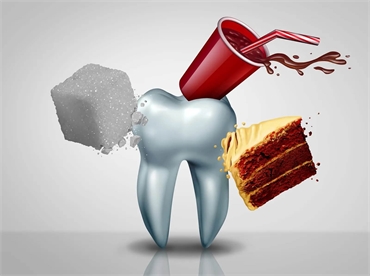Tooth Decay Prevention for College Students - A Must-Read Guide by Phil Collins from EssayService
July 26, 2023

Preventing Tooth Decay: A Must-Read for Sugar-Loving Students
In the frenetic mix of college activities, from lectures and assignments to exams and social engagements, maintaining oral health often doesn’t get the attention it deserves. However, overlooking the significance of dental hygiene can lead to severe problems like tooth decay, particularly for those who frequently give in to their sweet cravings. The good news is, comprehending the reasons behind tooth decay and adopting preventative measures can help keep your smile radiant throughout your college journey and beyond.
While your main focus in college is on studying and academic excellence, it’s equally essential to maintain good health, including oral hygiene. Just as you might rely on a nursing writing service for your assignments to manage time better, it’s wise to develop a systematic approach to your dental care routine as well.
Understanding Tooth Decay
Tooth decay, also known as dental caries, refers to the damage caused to the tooth enamel, the hard outer surface of your teeth. It occurs due to a reaction between sugars present in your diet and the bacteria that inhabit your mouth. These bacteria consume the sugars and produce acids that can harm your teeth, potentially leading to cavities.
Preventing tooth decay involves more than just brushing twice a day. It’s about understanding the relationship between your diet, oral hygiene habits, and dental health. As a college student juggling between classes, assignments, and social activities, it might seem challenging, but with a few strategic steps, it’s quite achievable.
Smart Eating Habits
Balancing your diet can significantly impact your oral health. Sugary snacks and drinks, although tempting, can escalate the risk of cavities.
Limit Sugary Treats: Sugar is the primary instigator of tooth decay. Aim to curtail your intake of sugary foods and beverages, reserving them for special occasions.
Healthy Alternatives: Swap out sugar-laden snacks with healthier choices such as fruits, vegetables, cheese, and nuts.
Regular Meals: Eating regular meals instead of constant snacking can help prevent tooth decay as it reduces the time your teeth are exposed to acid.
Include Calcium-Rich Foods: Foods plentiful in calcium, like milk, cheese, and yogurt, actively contribute to strengthening your teeth and preserving your enamel.
Chew Sugar-Free Gum: Habitually chewing sugar-free gum following meals can effectively stimulate saliva production, which naturally sweeps away bacteria and neutralizes the acid.
Avoid Late Night Snacking: Eating just before you sleep can be particularly harmful, as it doesn’t leave enough time for your saliva to wash away the acids.
Effective Oral Hygiene Practices
Just as you prioritize your learning and homework, proper oral hygiene practices should also be a part of your daily routine.
Adopt a Routine of Brushing Twice Daily: Consistently brush your teeth twice daily utilizing fluoride toothpaste. Fluoride notably aids in fortifying tooth enamel and averting decay.
Floss Daily: Flossing once a day helps remove food particles and bacteria stuck between your teeth, where your toothbrush can’t reach.
Schedule Regular Dental Check-Ups: Regularly scheduled check-ups and professional cleanings can adeptly assist in detecting early symptoms of tooth decay.
Use a Mouthwash: Adding a fluoride mouthwash to your everyday oral hygiene routine can offer an additional protective barrier against tooth decay.
Consistently Replace Your Toothbrush: Old, worn-out toothbrushes are considerably less effective at cleaning teeth. It’s a practical idea to replace your toothbrush roughly every three to four months.
Limit the Consumption of Acidic Drinks: Acidic beverages like soda and citrus juices can progressively erode tooth enamel. Try to curtail your intake and use a straw to minimize contact with your teeth.
Staying Hydrated
Water indisputably plays a critical role in preserving your overall and oral health. It helps wash away residual food particles and keeps your mouth moist, significantly reducing the risk of tooth decay.
Ensure Sufficient Water Intake: Make it a goal to consume at least eight glasses of water per day.
Rinse Your Mouth: Following the consumption of acidic or sugary food or drink, rinse your mouth with water to counteract the acids.
Avoid Dry Mouth: Dry mouth can escalate the risk of tooth decay. If you’re dealing with this issue, consult your dentist for suitable solutions.
Limit Alcohol: Alcohol can dehydrate your body and mouth, creating an environment where bacteria can thrive.
Hydrating Foods: Include water-rich foods like cucumbers and watermelons in your diet. They help with hydration and stimulate saliva production.
Balancing Studies and Oral Health
Just like managing your studies and assignments requires a plan, maintaining good oral health is also about creating and sticking to a routine. Remember, it’s easier to prevent tooth decay than to treat it.
Prioritize Your Routine: Amidst the busy college life, ensure to set aside specific time for your oral hygiene practices, much like you would for studying or doing assignments.
Breaks Are Important: When you’re studying for hours at a stretch, take short breaks and use this time to drink some water, rinse your mouth, or even have a quick snack that’s good for your teeth.
Seek Help: Just as you may seek assistance from academic support services for your studies, don’t hesitate to ask for help when it comes to oral health. Whether it’s speaking to your dentist about your concerns or seeking advice on proper techniques for brushing and flossing, remember, there’s always help available.
Conclusion
College life is filled with studying, assignments, and late-night snack runs. But amidst the hustle and bustle, don’t let your oral health suffer. By diligently following these simple yet profoundly effective steps, you can successfully prevent tooth decay and keep your smile gleaming. Remember, just as you might turn to the best paper writing services for academic help, don’t hesitate to seek professional dental care if you notice any problems. Maintaining good oral health is an investment that pays off in the long run.

